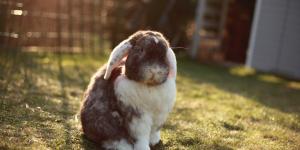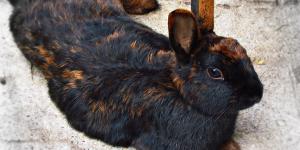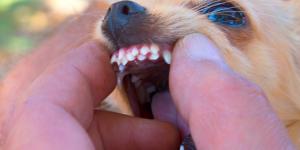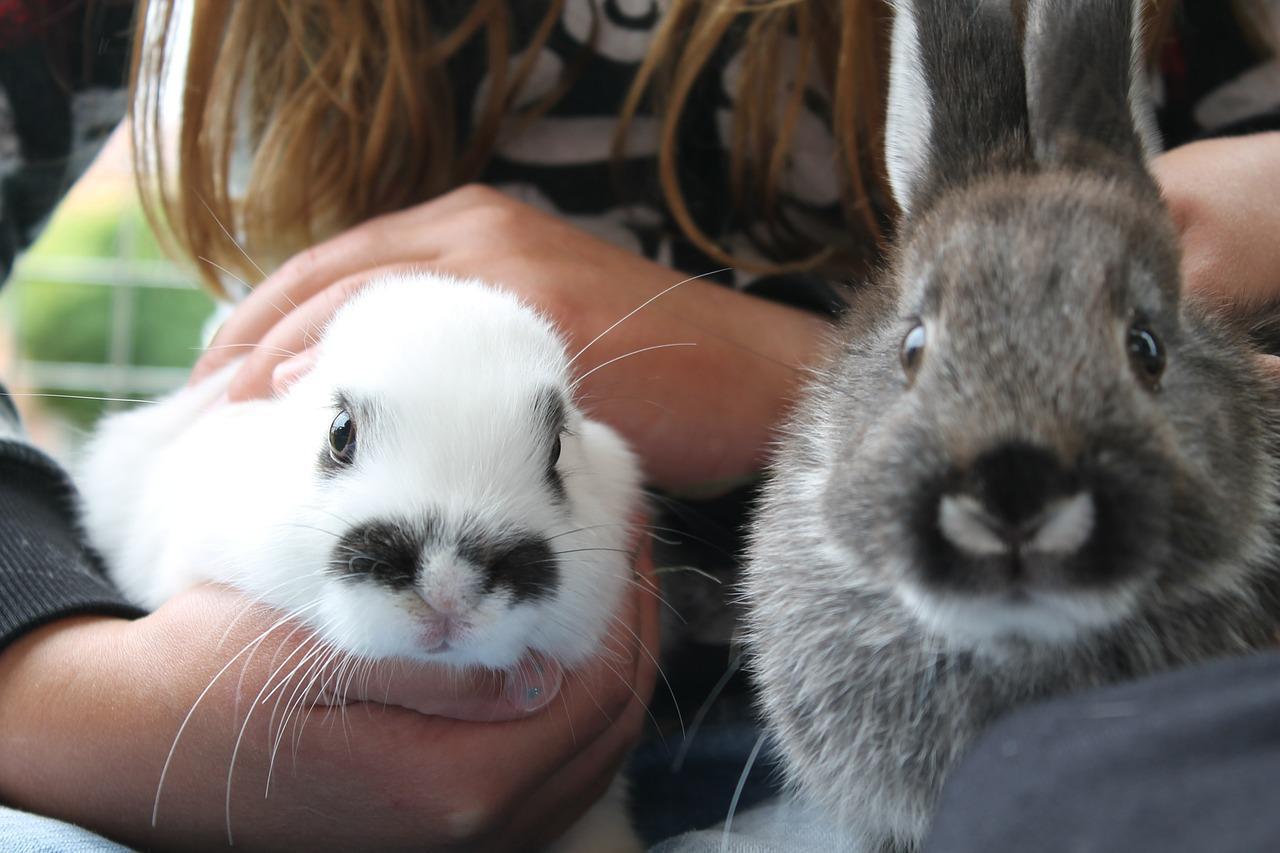Rabbits With Overgrown Teeth - Malocclusion in Rabbits



See files for Rabbits
When a rabbit's teeth are overgrown, they are said to have malocclusion. This because the teeth become misaligned between the upper and lower jaw. It is something which can cause serious trouble in the rabbit and even be fatal if not treated. Wild rabbits rarely develop malocclusion because their diet and behaviors mean they can naturally wear their teeth down to the right level. Domestic rabbits are more likely to develop this problem, often as an indirect result of the level of care their guardian's provide.
A rabbit's teeth keep growing throughout their lives, but AnimalWised explains the causes of rabbits with overgrown teeth. We also look at what treatment options are available for malocclusion in rabbitsand what to do when a rabbit's teeth become too long.
What is malocclusion in rabbits?
Malocclusion in rabbits refers to a dental condition where the teeth do not align properly, resulting in an abnormal bite. The word malocclusion translates literally into ‘bad bite’. It can affect both the incisor teeth (front teeth) and the cheek teeth (molars and premolars) of rabbits.
In a healthy rabbit, the incisor teeth are aligned so that they meet properly. Properly aligned teeth in rabbits have the top incisors overlapping the bottom incisors. This alignment allows the rabbit to efficiently chew and grind their food. In cases of malocclusion, the teeth may be misaligned, overgrown or growing at abnormal angles.
Learn more about rabbit dentition with our article on how many teeth does a rabbit have?
Is my rabbit grinding their teeth?
Regarding rabbit grinding teeth, rabbits naturally engage in a behavior called tooth purring or tooth grinding. This behavior involves the rabbit grinding their teeth together, which produces a soft purring or grinding sound. Tooth grinding in rabbits can have different meanings depending on the context:
- Contentment: rabbits may grind their teeth when they are relaxed and content. It is often accompanied by relaxed body language, such as lying down or sitting calmly.
- Pain or discomfort: in some cases, tooth grinding can be a sign of pain or discomfort, particularly if it is accompanied by other signs of distress, such as hunched posture or reduced appetite. Dental issues, including overgrown teeth, can cause pain and lead to tooth grinding.
It is important to differentiate between the normal tooth purring associated with contentment and the tooth grinding associated with pain or discomfort. If you notice persistent tooth grinding or other signs of dental issues, it is advisable to consult with a veterinarian who can evaluate the rabbit's condition and recommend appropriate treatment.

What causes malocclusion in rabbits?
There are several specific reasons why a rabbit's teeth may become overgrown, leading to malocclusion:
- Genetic factors: some rabbits are genetically predisposed to dental issues, including malocclusion. Certain breeds or lines of rabbits may have a higher likelihood of developing dental problems due to inherited traits.
- Diet: a rabbit's diet plays a crucial role in maintaining proper dental health. A diet lacking in sufficient fibrous material, such as hay, grass, and leafy greens, can contribute to tooth overgrowth. These fibrous foods help naturally wear down a rabbit's teeth through chewing and grinding. Without enough roughage in their diet, the teeth may not wear down properly, leading to overgrowth.
- Lack of dental wear: in some cases, a rabbit's teeth may not wear down properly due to a lack of appropriate chewing. This can occur if the rabbit is predominantly fed soft or finely ground food, lacks access to hay or grass, or has dental pain or discomfort that discourages normal chewing behavior.
- Dental trauma or injury: any injury or trauma to a rabbit's mouth or face, such as a fall, fight, or accidental impact, can disrupt the normal growth and alignment of their teeth. Damage to tooth roots or supporting structures can lead to subsequent abnormal tooth growth.
- Dental disease or infection: certain dental diseases, such as tooth root abscesses or infections, can disrupt normal tooth growth patterns and contribute to overgrowth. Inflammation and damage to the surrounding tissues can affect tooth alignment and cause abnormal tooth development.
It's important to note that these factors can often be interconnected. For example, a poor diet lacking in fiber can lead to insufficient dental wear, which in turn contributes to overgrowth. Similarly, rabbit dental disease or trauma can impact their ability to chew properly, leading to dental issues.
Dental diseases in rabbits are not the only potential problems they face. Learn more with our guide to the most common diseases in rabbits.
What happens to rabbits with overgrown teeth?
If a rabbit's teeth become overgrown, it can lead to several complications and health issues. Here are some potential consequences of untreated or severe tooth overgrowth:
- Difficulty eating: overgrown teeth can cause pain and discomfort, making it challenging for the rabbit to eat and chew properly. They may experience difficulty grasping and manipulating food, resulting in reduced food intake and weight loss.
- Malnutrition: insufficient food intake due to difficulty eating can lead to malnutrition. Rabbits require a high-fiber diet to maintain proper gastrointestinal health and overall well-being. Inadequate nutrition can result in a range of health problems, including digestive issues, weakness, and a compromised immune system.
- Oral infections and abscesses: overgrown teeth can create sharp edges or spurs that can injure the soft tissues in the mouth. These injuries can lead to open sores, ulcers, and the development of bacterial infections. Over time, oral infections can progress to abscesses, which are painful, pus-filled pockets that require veterinary treatment.
- Pain and discomfort: tooth overgrowth and associated oral problems can cause chronic pain and discomfort for rabbits. This can impact their overall quality of life, leading to changes in behavior, reduced activity levels, and a decreased willingness to eat or interact. Learn more about the signs of pain in rabbits.
- Jaw and facial abnormalities: prolonged tooth overgrowth can affect the alignment and positioning of the jaw and facial bones. This can result in deformities, such as a misaligned jaw or an abnormal appearance of the face.
- Eye and nasal problems: in some cases, overgrown incisors can interfere with normal eye and nasal function. The incisors may push against the tear ducts, leading to excessive tearing and eye discharge. They can also obstruct the nasal passages, causing difficulty in breathing and nasal discharge.
If left untreated, these complications can significantly impact a rabbit's health and wellbeing. Regular veterinary check-ups and prompt treatment of tooth overgrowth are essential to prevent these issues.
Treatment of overgrown rabbit teeth
The treatment for a rabbit with overgrown teeth or malocclusion typically involves addressing the underlying causes and managing the dental issues. One common method of treatment is dental trimming or filing. This is performed by a veterinarian experienced in rabbit dentistry. The procedure involves carefully filing down the overgrown teeth to restore proper length and alignment.
In addition to dental trimming, other treatment approaches may include:
- Diet modification: ensuring a proper diet is crucial for maintaining good dental health in rabbits. Providing a balanced diet that includes an appropriate amount of high-quality hay, fresh greens, and safe chew toys can help promote natural wear of the teeth and prevent overgrowth.
- Enrichment and environmental adjustments: encouraging natural chewing behavior through the provision of safe chew toys, untreated wooden blocks, and appropriate forage can aid in wearing down the teeth naturally. Creating an enriching environment that stimulates the rabbit's natural instincts can help prevent dental problems.
- Pain management: in cases where dental malocclusion has caused pain or discomfort, pain management may be necessary. Your veterinarian may prescribe pain medications or anti-inflammatory drugs to alleviate any discomfort associated with dental issues.

Rabbit malocclusion prevention
Preventing overgrown teeth in rabbits involves implementing proper care and management practices. Here are some key steps to help prevent malocclusion:
- Balanced diet: providing a well-balanced diet is crucial for maintaining good dental health in rabbits. The diet should include a high-quality grass hay (such as timothy or orchard grass) as the main component. Hay provides the necessary roughage that helps wear down the teeth naturally. Additionally, fresh leafy greens and vegetables suitable for rabbits can be offered in moderation to provide additional chewing opportunities.
- Limit sugary or starchy treats: avoid feeding rabbits sugary or starchy treats as they can contribute to dental issues. These include treats high in carbohydrates, such as fruits, bread, and commercial treats with added sugars. Instead, opt for healthier, fiber-rich treats or offer safe chew toys specifically designed for rabbits.
- Encourage chewing: provide safe and appropriate chew toys to encourage natural chewing behavior. Rabbits have a natural instinct to chew, which helps wear down their teeth. Safe chew toys can include untreated wooden blocks, willow balls, or cardboard tubes. Avoid offering toys made of materials that can splinter or cause digestive blockages.
- Regular dental check-ups: schedule regular veterinary check-ups for your rabbit, including dental examinations. A veterinarian experienced in rabbit dentistry can assess the rabbit's teeth, identify any early signs of malocclusion, and provide appropriate treatment or preventive measures.
- Environmental enrichment: create an enriching environment for your rabbit to stimulate natural behaviors and encourage proper dental wear. Provide opportunities for exercise, exploration, and mental stimulation. This can include providing tunnels, hiding places, platforms, and foraging activities to keep your rabbit active and engaged.
- Early detection and intervention: monitor your rabbit's eating habits and observe for any signs of dental issues. If you notice changes in appetite, difficulty eating, weight loss, drooling, or abnormal chewing behavior, consult with a veterinarian promptly. Early detection and intervention can help prevent the progression of dental problems.
Remember, each rabbit is unique, and their dental needs may vary. It's important to consult with a veterinarian who can provide personalized guidance based on your rabbit's specific requirements and health condition.
By implementing a proper diet, offering appropriate chew toys, providing enrichment, and seeking regular veterinary care, you can significantly reduce the risk of malocclusion in rabbits and promote good dental health throughout their lives.
If you want to know more about how to care for your rabbit or troubleshoot any health problems, read this article on vaccinations for rabbits.

This article is purely informative. AnimalWised does not have the authority to prescribe any veterinary treatment or create a diagnosis. We invite you to take your pet to the veterinarian if they are suffering from any condition or pain.
If you want to read similar articles to Rabbits With Overgrown Teeth - Malocclusion in Rabbits, we recommend you visit our Other health problems category.







